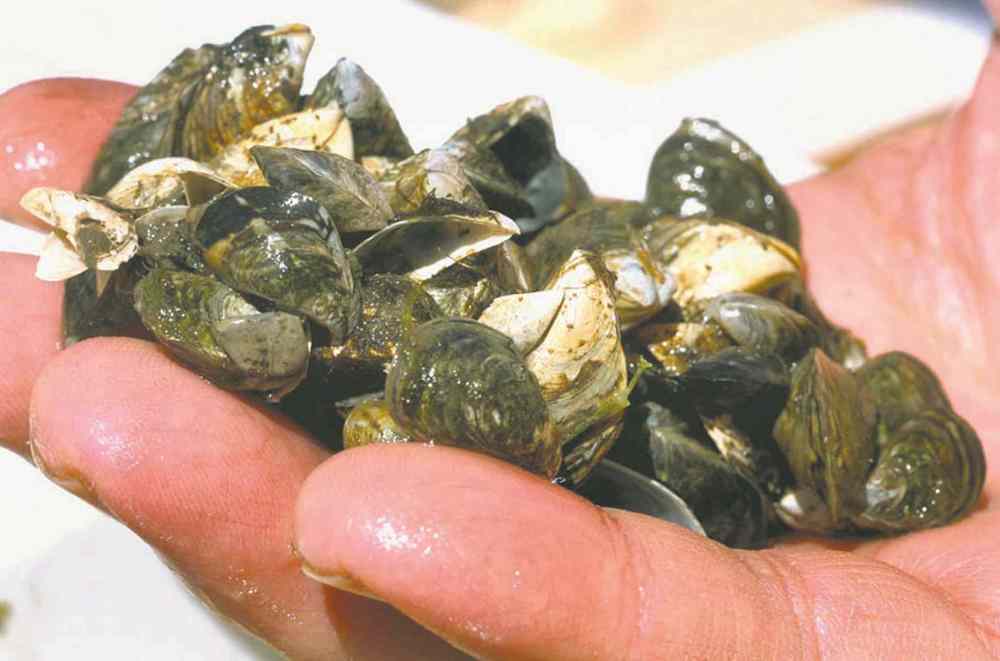Zebra mussels muscle way into Manitoba
Advertisement
Read this article for free:
or
Already have an account? Log in here »
To continue reading, please subscribe:
Monthly Digital Subscription
$1 per week for 24 weeks*
- Enjoy unlimited reading on winnipegfreepress.com
- Read the E-Edition, our digital replica newspaper
- Access News Break, our award-winning app
- Play interactive puzzles
*Billed as $4.00 plus GST every four weeks. After 24 weeks, price increases to the regular rate of $19.00 plus GST every four weeks. Offer available to new and qualified returning subscribers only. Cancel any time.
Monthly Digital Subscription
$4.75/week*
- Enjoy unlimited reading on winnipegfreepress.com
- Read the E-Edition, our digital replica newspaper
- Access News Break, our award-winning app
- Play interactive puzzles
*Billed as $19 plus GST every four weeks. Cancel any time.
To continue reading, please subscribe:
Add Winnipeg Free Press access to your Brandon Sun subscription for only
$1 for the first 4 weeks*
*$1 will be added to your next bill. After your 4 weeks access is complete your rate will increase by $0.00 a X percent off the regular rate.
Read unlimited articles for free today:
or
Already have an account? Log in here »
Hey there, time traveller!
This article was published 18/10/2013 (4367 days ago), so information in it may no longer be current.
A long-dreaded aquatic pest that could potentially cause millions of dollars in damage to municipalities and the local fishing industry has been detected in Manitoba for the first time.
Zebra mussels were recently found on the hull of a private boat and a dock at Winnipeg Beach and on some fishing boats dry-docked at Gimli.
The freshwater mollusc, native to southern Russia, arrived in North America decades ago and recently became established in the Red River watershed south of the border.

It appears it was only a matter of time before the pest found its way to Manitoba.
“We still don’t know how Lake Winnipeg became infested,” said Laureen Janusz, a fisheries biologist with Manitoba Conservation and Water Stewardship.
She said zebra mussels could have drifted as microscopic larvae along the Red River into Manitoba or could have attached themselves to a boat operated in infested water.
Officials are uncertain how well the mollusc will thrive in Lake Winnipeg or other Manitoba water bodies, and they’re keen on containing it.
If it thrives, it could contribute to the growth of green-algae blooms on the lake, curb production of certain fish species and foul beaches. Because of their ability to attach to solid objects, they can clog water-treatment-plant intake pipes and effluent-discharge pipes.
Zebra mussels look like small clams with a yellowish or brownish D-shaped shell that has dark- and light-coloured stripes. They can grow up to five centimetres long but are generally under 2.5 centimetres in length.
Given the size of those found so far, they could have been in Manitoba for up to a year.
The molluscs can multiply rapidly. “It’s my understanding that an adult zebra mussel can produce up to a million eggs a year,” Janusz said.
Though certain Manitoba fish and waterfowl would be natural predators, it’s unknown whether they would be able to control an infestation in Lake Winnipeg.
Eradication techniques, such as the introduction of species that would feed on or otherwise kill the mussels, come with environmental risks of their own.
“If they (zebra mussels) become established in Lake Winnipeg, given the size of the lake, at this point I don’t believe there is a lot that can be done,” Janusz said.
The province learned of the problem after receiving a call last weekend from a boat owner at Winnipeg beach who spotted a zebra mussel on a vessel that was being winterized. Janusz drove out and discovered more of the pests on the underside of the dock. A check of some fishing boats in Gimli the same weekend produced more such discoveries. On Tuesday, an Ontario expert validated the finds.
This is the first time provincial officials have detected live zebra mussels in Manitoba. Some years ago, a dead one was found on a piece of equipment, but no more had been seen since.
The province has started an investigation to determine where the mollusc is established in Manitoba. It is deploying staff to Winnipeg Beach, Gimli and Hecla to inform residents and watercraft owners about the problem so it can receive help in tracking the invasive species. Government boat-inspection teams will be in Winnipeg Beach and Gimli starting this weekend and until the lake freezes.
The government is asking all who live along or boat in the Red River, Nelson River and Lake Winnipeg to keep an eye out for zebra mussels, report any findings and clean boats and water-related equipment before using it elsewhere.
If you think you’ve spotted a zebra mussel, call the aquatic invasive species line at 1-877-867-2470. For more information, visit: www.gov.mb.ca/waterstewardship/stopais/.
larry.kusch@freepress.mb.ca


